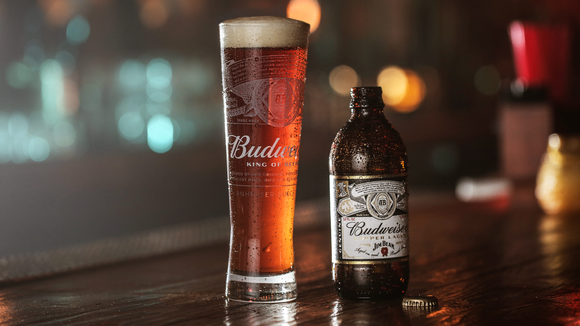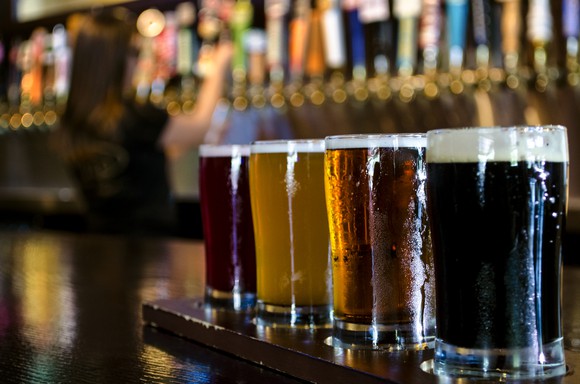It's been a busy few months for Anheuser-Busch InBev (BUD 0.09%). The company just completed the IPO of its Asian unit, raising $5 billion as it continues to look for ways to pay down debt following its megamerger with SAB Miller. Then AB InBev stock plunged 11% following its third-quarter earnings report, surrendering nearly $20 billion in market value after the company revealed that beer shipments had fallen in major markets including the U.S., China, and Brazil, and management trimmed its guidance for the year.
Now, the Budweiser-owner is making another major move, taking over Craft Brew Alliance (BREW +0.00%), with its portfolio of brands like Kona, RedHook, and Widmer.
The two companies had already been partners, and AB InBev owned 31.2% of the craft beer distributor, but the companies announced Tuesday morning that AB InBev would buy out the remainder of Craft Brew Alliance for $16.50 per share, more than double Monday's closing price, but less than the acquisition price stipulated in a previous agreement. However, the stock was trading above $16.50 earlier this year, so it's not as big of a win for CBA investors as it might seem.

Image source: AB InBev.
What AB InBev is buying
Valued at $321 million under the deal, CBA holds a slew of craft beer brands that AB InBev will now take full control of, including Kona, Appalachian Mountain, Cisco, Omission, Redhook, Square Mile Cider, Widmer Brothers, and Wynwood. AB InBev was already handling the vast majority of distribution for those brands, so beer drinkers and investors shouldn't expect that to change much, at least in the near future. The big difference will be that AB InBev will reap the full benefit of sales from the CBA brands, and be able to invest in and grow them.
Anheuser-Busch said that CBA will join its high-performing Brewers Collective, a group of craft brands in which it has invested $130 million over the last three years to expand overall capacity by 31%.
The biggest prize in the CBA portfolio is Kona Brewing Company, a fast-growing Hawaiian brand. Its shipments rose 10% in the first half of the year, and it now provides more than half of CBA's total sales. But overall net sales at CBA have been underwhelming, down 1.6% through the first half of 2019.

Image source: Getty Images.
Craft beer has shifted
In the first half of the decade, craft beer was all the rage in the beer business, as consumer preference shifted away from giant brands like Budweiser, Miller, and Coors. The growth in beer sales went primarily to small microbrews and craft beers, and small breweries sprouted up across the country to meet the demand.
However, over the last few years, the craft beer market has matured and appears to be hitting a plateau. In 2018, overall beer sales fell 0.8% while whiskey and other spirits gained in popularity. Craft beer sales have continued to buck the beer market trend, but volume growth has been modest, just 3.9% last year.
Global companies like AB InBev recognized which way the wind was blowing, and responded by acquiring craft brews and even launching craft brands of their own, a pattern Anheuser-Busch is continuing with the CBA acquisition. However, the brewing giant already faces its own challenges with its craft brew portfolio. AB InBev's 11 craft brands grew sales just 1% last year, and sales of its two biggest brands, Goose Island and Shock Top, declined by 7% and 23% respectively, according to Brewers Association.
Anheuser-Busch acquired Goose Island for just $38.8 million in 2011, while it developed Shock Top in-house.
Meanwhile, there are other signs that the broader market is continuing to shift away from beer, with younger drinkers moving toward the newest trendy beverage -- hard seltzer. Sales of White Claw hard seltzer -- the dominant brand in the market -- exploded over the summer, more than tripling in July. Its popularity has reached the point where shortages have been reported -- just the latest sign that drinkers are reaching for options with fewer calories than beer.
Ultimately, Anheuser-Busch may be getting a good deal. In September, MKM Partners estimated the Kona brand to be worth $350 million, more than the $321 million Anheuser Busch is paying to acquire all of CBA. The bigger challenge for AB InBev will be to find a way to thrive in an alcohol market that is slowly turning away from beer.
The company has its own plan of attack in seltzer: In August, it launched Natural Light seltzer and Bud Light seltzer is expected to debut early next year. However, playing catch-up with the latest trends may not be the best way for the company to grow over the long term, especially considering Anheuser-Busch's considerable debt burden.
Keep an eye on the Kona brand's growth to see if the CBA acquisition pays off.
